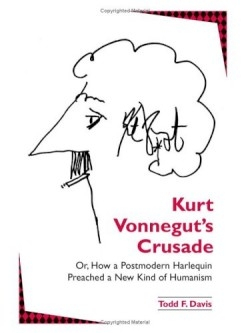Kurt Vonnegut's Crusade
or, How a Postmodern Harlequin Preached a New Kind of Humanism
Has Kurt Vonnegut’s time come and gone? By the mid-1970s, after the successes of Cat’s Cradle and Slaughterhouse Five, Vonnegut was a major literary figure. No author of American fiction in that decade had more star power. While his devoted readers have kept his entire body of work in print, Vonnegut is no longer a household name and his work no longer the object of attention, popular or critical, that it once was. Some critics have characterized his later books as the product of an exhausted imagination, and certainly none of his books written after the 1980s has captured the public mood.
With this book, the author looks to change that. Davis is professor of English at Penn State University, Altoona, and author of works of cultural criticism as well as co-editor of a work on literary theory. Davis loves his subject, and in an attempt to refocus attention on Vonnegut, labels him a “postmodern humanist,” an awkward linkage, as humanism lacks clear associations with postmodernism. Postmodern theory may not strike every reader as the best frame for understanding Vonnegut’s work, but Davis’s effort requires that readers revisit and reconsider—worthwhile endeavors in this case.
Vonnegut’s work assumes many forms: science fiction, satire, polemic, and philosophy. Davis argues at length that as a postmodern novelist and thinker, Vonnegut has abandoned all notions of objective truth and suggests instead that the postmodern condition compels a fastening onto the smaller truths of families and local communities. Vonnegut’s humanism operates within these limitations: it cannot make claims for all people or all times and places.
Vonnegut’s works do fit the category “metafiction,” but his skepticism is closer to that of Mark Twain than to generally recognized postmodern writers like Thomas Pynchon or John Barth. Both Twain and Vonnegut attempt a fragile balance between cynicism and humor, and in their works pessimism often overwhelms the belief in humanity that inspired the satire in the first place. Neither Twain nor Vonnegut can endure the deceptions practiced by the powerful on the helpless; both respond with tales redeemed by wit and a yearning that humanity be other than it is: kinder, more honest, and better stewards of this earth.
There is no doubting Vonnegut’s humanism, his belief “that humanity is at the center of the universe, the fulfiller or the frustrator of the grandest dreams of God Almighty.” Lacking the larger shared meanings of religion or political consensus, perhaps Vonnegut’s prescription for human connection may be what is needed to cure current postmodern ills. The author of Slaughterhouse Five has certainly earned a hearing.
Disclosure: This article is not an endorsement, but a review. The publisher of this book provided free copies of the book to have their book reviewed by a professional reviewer. No fee was paid by the publisher for this review. Foreword Reviews only recommends books that we love. Foreword Magazine, Inc. is disclosing this in accordance with the Federal Trade Commission’s 16 CFR, Part 255.

